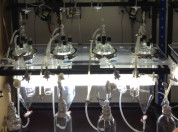Droevendaalsesteeg 10
6708 PB Wageningen
The Netherlands
Currently, more evidence is accumulating that a variety of organism groups have the ability to rapidly adapt genetically to environmental stressors, which may have important eco-evolutionary implications for population demography and ecosystem functioning. However, the knowledge about if and to what extent microevolutionary adaptation may mediate the interactive effects of stressors is rare. So in my project, I am focusing on investigating how populations with different evolutionary histories respond to the same or new combinations of related stressors.
Shuwen Han studied wastewater and polluted soil treatment during her master's period in China. Under the supervision of Prof. Xiaozhi Wang, they investigated organic pollutants adsorption in soil and aqueous solution by as-prepared biochars under various environmental conditions. Afterward, Shuwen did her internship at the Griffth University of Australia for over three months. During that period, she studied stable isotope carbon and nitrogen composition technologies. Meanwhile, she also participated in a field sampling trip in Yarraman Forest and collected samples for studying the biogeochemical cycles of carbon and nitrogen with Ph.D. students. This experience motivates her to start a new journey as a Ph.D. student in ecological science. Currently, in her project in NIOO, evolutionary experiments are designed to study how exposure of populations to a selection regime exerted by specific stressor results in adaptation to this stressor and will affect the ability to cope with other important stressors.
